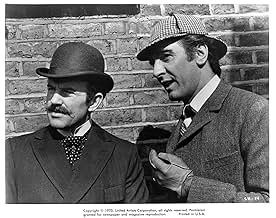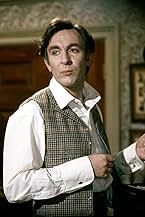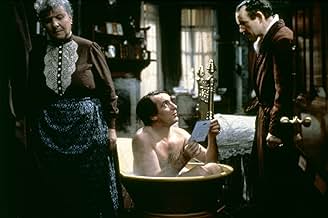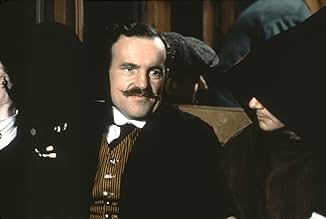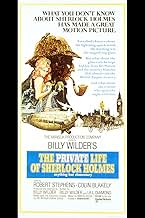La vie privée de Sherlock Holmes
Titre original : The Private Life of Sherlock Holmes
- 1970
- Tous publics
- 2h 5min
NOTE IMDb
7,0/10
14 k
MA NOTE
Quand un Holmes qui s'ennuie se saisit du cas de Gabrielle Valladon après une tentative d'homicide, la recherche du mari disparu le mène au Loch Ness et au monstre légendaire.Quand un Holmes qui s'ennuie se saisit du cas de Gabrielle Valladon après une tentative d'homicide, la recherche du mari disparu le mène au Loch Ness et au monstre légendaire.Quand un Holmes qui s'ennuie se saisit du cas de Gabrielle Valladon après une tentative d'homicide, la recherche du mari disparu le mène au Loch Ness et au monstre légendaire.
- Réalisation
- Scénario
- Casting principal
- Récompenses
- 3 nominations au total
Geneviève Page
- Gabrielle Valladon
- (as Genevieve Page)
Avis à la une
Sherlock Holmes is certainly one of literature's all-time most famous characters, the subject of countless novels and short stories by Sir Arthur Conan Doyle between 1887 and 1927. Since then, he has become possibly the most portrayed movie character in cinema history {according to the Guinness Book of Records, over 70 actors have played the coveted part in more than 200 films}. So rich was Conan Doyle's description of Holmes that many readers have come to think of him as a historical figure, and derive enjoyment from speculating on the finer detail's of the private detective's life. Likewise, many authors and filmmakers have decided to expand on the stories of Sherlock Holmes, creating new mysteries that perhaps Dr. John Watson forgot to publish. 'The Private Life of Sherlock Holmes (1970)' is such a tale, directed by master filmmaker Billy Wilder, who also produced and co-wrote {with long-time collaborator I.A.L. Diamond} the film.
'The Private Life of Sherlock Holmes' was originally written and filmed as a three-hour roadshow picture, an episodic compilation of Sherlock Holmes' most difficult mysteries. Unfortunately, the studio's unwillingness to take a risk with such a format meant that entire sequences, including a prologue with Watson's grandson in London, and a flashback to Holmes' university years, were inharmoniously cut from the film. Though I was initially unaware of this studio intervention, I met these findings with anger and frustration; while the surviving picture is merely a good film, Billy Wilder's original vision would certainly have been something special. I hear that at least one episode has been restored into later DVD editions of the film, but most of the missing footage remains, devastatingly, permanently absent. The story, as we now find it, is comprised of two unequal portions: the first concerns Holmes' interactions with a glamorous ballet dancer (Tamara Toumanova), casting doubt on the famous detective's sexuality, while the second mystery demonstrates the efforts of Holmes and Watson to locate the husband of an beautiful woman (Geneviève Page) suffering from amnesia.
When little-known British actor Robert Stephens first appeared on screen as Det. Sherlock Holmes, I wasn't certain that he was the suitable man for the job {Wilder had initially considered Peter O'Toole as Holmes, and Peter Sellers as Watson, before deciding to cast unknowns}. However, despite initially appearing too flamboyant to play Conan Doyle's brilliant investigator, I'm happy to say that, by the end of the film, he had well-and-truly grown on me. While Stephens didn't quite match the stories' depiction of Holmes, this is only because Dr. Watson's dramatisations often tend to embellish the truth and misrepresent facts about the detective's personality and demeanour a point that is alluded to early in the film itself. Colin Blakely, though given very little to do, is a lot of fun as Holmes' companion and biographer, playing the role a lot less serious than I've seen it done in the past. Christopher Lee also appears as Holmes' intellectually-equal brother Mycroft, whose associations with the British government may prove crucial to the case being investigated.
'The Private Life of Sherlock Holmes' was originally written and filmed as a three-hour roadshow picture, an episodic compilation of Sherlock Holmes' most difficult mysteries. Unfortunately, the studio's unwillingness to take a risk with such a format meant that entire sequences, including a prologue with Watson's grandson in London, and a flashback to Holmes' university years, were inharmoniously cut from the film. Though I was initially unaware of this studio intervention, I met these findings with anger and frustration; while the surviving picture is merely a good film, Billy Wilder's original vision would certainly have been something special. I hear that at least one episode has been restored into later DVD editions of the film, but most of the missing footage remains, devastatingly, permanently absent. The story, as we now find it, is comprised of two unequal portions: the first concerns Holmes' interactions with a glamorous ballet dancer (Tamara Toumanova), casting doubt on the famous detective's sexuality, while the second mystery demonstrates the efforts of Holmes and Watson to locate the husband of an beautiful woman (Geneviève Page) suffering from amnesia.
When little-known British actor Robert Stephens first appeared on screen as Det. Sherlock Holmes, I wasn't certain that he was the suitable man for the job {Wilder had initially considered Peter O'Toole as Holmes, and Peter Sellers as Watson, before deciding to cast unknowns}. However, despite initially appearing too flamboyant to play Conan Doyle's brilliant investigator, I'm happy to say that, by the end of the film, he had well-and-truly grown on me. While Stephens didn't quite match the stories' depiction of Holmes, this is only because Dr. Watson's dramatisations often tend to embellish the truth and misrepresent facts about the detective's personality and demeanour a point that is alluded to early in the film itself. Colin Blakely, though given very little to do, is a lot of fun as Holmes' companion and biographer, playing the role a lot less serious than I've seen it done in the past. Christopher Lee also appears as Holmes' intellectually-equal brother Mycroft, whose associations with the British government may prove crucial to the case being investigated.
This has always been one of my favorite movies. A good take on Holmes, a witty story, a bittersweet ending and music by Miklos Rozsa that sets the tone perfectly. When I saw it had become available on DVD I rushed out and bought it, without even checking to see the extras on the disc. The quality of the print is all right, but there are times it should have been better. The extras just kept getting better. Christopher Lee remembers his times playing Holmes in other films as well as Mycroft in this movie. Then there's the film editor who mentions parts of the movie I never heard of. Then the disc shows the deleted scenes in various forms and it's amazing what was cut. There is only one little bit I feel would have explained things in the movie better, but all the scenes are interesting. A must for people who love this film and want a wealth of information.
When a bored Holmes (Robert Stephens who also played Holmes on the stage and in TV series 'The Rivals of Sherlock Holmes') eagerly takes the case of Gabrielle Valladon (Genevieve Page) after an attempt on her life , the search for her missing husband leads to Sherlock and Watson (Colin Blakely) towards Loch Ness and the legendary monster. This affectionate story reveals the secret allegedly hidden by Holmes and Watson .
Atypical Holmes movie , resulting to be a extremely personal pastiche of the Arthur Conan Doyle stories and takes a melancholic point of sight at famous eye private . It is packed with intrigue , thrills , emotion , taste , wit , and of course ,intrigue . In the flick appears the usual of the Arthur Conan Doyle's novels : Mycroft (Sherlock's brother , well played by Christopher Lee) , Mistress Hudson (Irene Handl) , and as always Doctor Watson (Colin Blakely). Furthermore , a notorious secondary cast as Clive Revill , Stanley Holloway as an undertaker , Catherine Lacey in her last cinema film and the classic dancer Tamara Toumanova . The film has an enjoyable atmosphere , it's in wonderful color that originates a glamorous setting created by the magnificent cameraman Chistopher Challis , and filmed at Pinewood Studios , Buckinghamshire, and Inverness , Highland , Scotland . Production design by the expert Alexandre Trauner is of first rate , the movie is very atmospheric , 221 Baker Street home , the streets of London , castles are very well designed .
Robert Stephens's interpretation is magnificent, he's one of the best Sherlock Holmes in the cinema , likeness to Peter Cushing and Jeremy Brett in television. Robert Stephens as Holmes plays in a clever , broody and impetuous manner . Colin Blakely plays as Watson with humor, goofy and joy , he's the perfect counterpoint to Holmes . However , initially Peter O'Toole was going to play Sherlock Holmes with Peter Sellers playing Dr. Watson, but Billy Wilder decided to go with lesser known stars instead . Originally, the scenes featuring the Loch Ness Monster were intended to be filmed in the actual Loch , a life-size prop was built which had several Nessie-like humps used to disguise flotation devices , the humps were removed, however, at Billy Wilder's request. Unfortunately, during a test run in Loch Ness, the Monster-prop sank and was never recovered ; a second prop was built, but was only filmed inside a studio tank . At the request of director Billy Wilder, composer Miklós Rózsa adapted music from his own Violin Concerto , opus 24 , as the basis for the film score, supplementing this with further original music.
This special Billy Wilder movie takes melancholy look at Holmes . Apparently, he had been a fan of Sherlock Holmes for many years prior to making this picture. Wilder said of this flick in the book 'Conversations with Wilder' by 'Cameron Crowe' : " when I came back from Paris, it was an absolute disaster, the way it was cut. The whole prologue was cut, a half-sequence was cut , in fact it was intended as a 3 and half hour film . I had tears in my eyes as I looked at the thing. It was the most elegant picture I've ever shot ¨ . The motion picture was panned by the critics whose reputation should soar in future years , being recently a 12 minutes restored . Rating : Better than average , 7/10 . Well worth watching .
Atypical Holmes movie , resulting to be a extremely personal pastiche of the Arthur Conan Doyle stories and takes a melancholic point of sight at famous eye private . It is packed with intrigue , thrills , emotion , taste , wit , and of course ,intrigue . In the flick appears the usual of the Arthur Conan Doyle's novels : Mycroft (Sherlock's brother , well played by Christopher Lee) , Mistress Hudson (Irene Handl) , and as always Doctor Watson (Colin Blakely). Furthermore , a notorious secondary cast as Clive Revill , Stanley Holloway as an undertaker , Catherine Lacey in her last cinema film and the classic dancer Tamara Toumanova . The film has an enjoyable atmosphere , it's in wonderful color that originates a glamorous setting created by the magnificent cameraman Chistopher Challis , and filmed at Pinewood Studios , Buckinghamshire, and Inverness , Highland , Scotland . Production design by the expert Alexandre Trauner is of first rate , the movie is very atmospheric , 221 Baker Street home , the streets of London , castles are very well designed .
Robert Stephens's interpretation is magnificent, he's one of the best Sherlock Holmes in the cinema , likeness to Peter Cushing and Jeremy Brett in television. Robert Stephens as Holmes plays in a clever , broody and impetuous manner . Colin Blakely plays as Watson with humor, goofy and joy , he's the perfect counterpoint to Holmes . However , initially Peter O'Toole was going to play Sherlock Holmes with Peter Sellers playing Dr. Watson, but Billy Wilder decided to go with lesser known stars instead . Originally, the scenes featuring the Loch Ness Monster were intended to be filmed in the actual Loch , a life-size prop was built which had several Nessie-like humps used to disguise flotation devices , the humps were removed, however, at Billy Wilder's request. Unfortunately, during a test run in Loch Ness, the Monster-prop sank and was never recovered ; a second prop was built, but was only filmed inside a studio tank . At the request of director Billy Wilder, composer Miklós Rózsa adapted music from his own Violin Concerto , opus 24 , as the basis for the film score, supplementing this with further original music.
This special Billy Wilder movie takes melancholy look at Holmes . Apparently, he had been a fan of Sherlock Holmes for many years prior to making this picture. Wilder said of this flick in the book 'Conversations with Wilder' by 'Cameron Crowe' : " when I came back from Paris, it was an absolute disaster, the way it was cut. The whole prologue was cut, a half-sequence was cut , in fact it was intended as a 3 and half hour film . I had tears in my eyes as I looked at the thing. It was the most elegant picture I've ever shot ¨ . The motion picture was panned by the critics whose reputation should soar in future years , being recently a 12 minutes restored . Rating : Better than average , 7/10 . Well worth watching .
This film is sometimes described as a comedy, and while it has humorous bits (a more sardonic and biting form of humour most of the time), it has never really felt at home being classified as a comedy, in my estimation. I do like the rapid-fire wit that Holmes seems to have here (a bit more in abundance than in the canonical Conan Doyle stories), but the Holmes presented here is a bit more dark and brooding, more akin to the extra-canonical 'Seven Percent Solution' Holmes in many ways.
Wilder was an extraordinary director and genius who sometimes gets carried away with his subject (in this regard, he is sometimes compared with Stanley Kubrick). His films are often of epic-proportions, even though they are not essentially 'epic' subjects. This film is reputed to have been nearly twice as long as the final cut version, but this may be apocryphal in that much of the raw footage never made it to final print and production. The restoration available on the disc currently available is, in fact, rather minimal - a few scenes and a few extras, but not much more than the original release of the film. This is disappointing to many fans, but in fact is more than most of us have had for a long time, as the somewhat choppy film was often mercilessly cut for television broadcast.
Holmes in this case is played by Robert Stephens, an unlikely Holmes in comparison to standards such as Rathbone, Brett, or Gillette, but still an interesting choice - quintessentially British, reserved but daring, brilliant yet flawed and faltering. Colin Blakely presents a stronger Watson than often portrayed before (this film, being made in 1970, presented this as a newer idea for Watson, one that has been picked up by many subsequent productions). Wilder has the actors play at various issues of Victorian sensibility and morality, including the implication (dismissed in the end) that Holmes might have a sexual identity issue. Christopher Lee, who himself plays Holmes in other productions, plays Holmes' smarter brother Mycroft here, to good effect.
The story line does have some inspiration from the canonical stories (the Bruce-Partington Plans, for one), and from Gillette's play (the strange case of Miss Faulkner, introducing an ending that allowed for a love interest for Holmes in the end), but for the most part takes the characters from Conan Doyle and runs far afield. Still, this is must-see film for any fan of Holmes, and any fan of Wilder, who saw this as one of his last great productions.
Wilder was an extraordinary director and genius who sometimes gets carried away with his subject (in this regard, he is sometimes compared with Stanley Kubrick). His films are often of epic-proportions, even though they are not essentially 'epic' subjects. This film is reputed to have been nearly twice as long as the final cut version, but this may be apocryphal in that much of the raw footage never made it to final print and production. The restoration available on the disc currently available is, in fact, rather minimal - a few scenes and a few extras, but not much more than the original release of the film. This is disappointing to many fans, but in fact is more than most of us have had for a long time, as the somewhat choppy film was often mercilessly cut for television broadcast.
Holmes in this case is played by Robert Stephens, an unlikely Holmes in comparison to standards such as Rathbone, Brett, or Gillette, but still an interesting choice - quintessentially British, reserved but daring, brilliant yet flawed and faltering. Colin Blakely presents a stronger Watson than often portrayed before (this film, being made in 1970, presented this as a newer idea for Watson, one that has been picked up by many subsequent productions). Wilder has the actors play at various issues of Victorian sensibility and morality, including the implication (dismissed in the end) that Holmes might have a sexual identity issue. Christopher Lee, who himself plays Holmes in other productions, plays Holmes' smarter brother Mycroft here, to good effect.
The story line does have some inspiration from the canonical stories (the Bruce-Partington Plans, for one), and from Gillette's play (the strange case of Miss Faulkner, introducing an ending that allowed for a love interest for Holmes in the end), but for the most part takes the characters from Conan Doyle and runs far afield. Still, this is must-see film for any fan of Holmes, and any fan of Wilder, who saw this as one of his last great productions.
This is fun. It wouldn't be if it had strayed too far from the Holmes persona or if it were not a good movie. Holmes is a favorite from childhood, and odd take-offs on him are generally not appreciated. I have settled on the Jeremy Brett series as the definitive version, but enjoy others that are well done. To me, with remakes and other versions, if the piece is well done, it is not only acceptable but enjoyable. With remakes, I don't know what's worse - it being a general flop as a movie or their changing it all around and calling it the same thing. Sometimes, both happen. Usually, if you like the subject matter, you will probably like a good adaptation, if a bit more inventive that the source material. The Seven Percent Solution movie was well done and enjoyable.
I haven't seen a lot of Robert Stephens, but have appreciated what I have. I looked him up and found that this was pretty light fare for his experience. This is a quality portrayal by him, and the others do a good job as well. The overall production is pleasing. The Dr. Watson portrayal mystifies a bit, that here and in other things, they make him sort of ditsy. That doesn't fit the original stories, nor what Holmes' temperament would seem to tolerate as a companion or assistant with his careful work. Maybe it came from the early Rathbone series with Nigel Bruce. Whether intentional or not, he nearly always had a bumbler quality to his portrayal.
This is a worthy production in all aspects, which I would think garnered some critical approval at its time of release. I can see why it would take the public a while to adjust to seeing Sherlock Holmes as presented here. But, it speaks of the film's overall quality that it has aged well.
I haven't seen a lot of Robert Stephens, but have appreciated what I have. I looked him up and found that this was pretty light fare for his experience. This is a quality portrayal by him, and the others do a good job as well. The overall production is pleasing. The Dr. Watson portrayal mystifies a bit, that here and in other things, they make him sort of ditsy. That doesn't fit the original stories, nor what Holmes' temperament would seem to tolerate as a companion or assistant with his careful work. Maybe it came from the early Rathbone series with Nigel Bruce. Whether intentional or not, he nearly always had a bumbler quality to his portrayal.
This is a worthy production in all aspects, which I would think garnered some critical approval at its time of release. I can see why it would take the public a while to adjust to seeing Sherlock Holmes as presented here. But, it speaks of the film's overall quality that it has aged well.
Le saviez-vous
- AnecdotesBy the time of filming, Sir Christopher Lee had become famous as Count Dracula. When he and Billy Wilder walked on the shores of Loch Ness at dusk, with bats circling overhead, Wilder said to him, "You must feel quite at home here."
- GaffesThe events start in August 1887 and apparently take place in the following weeks or, at most, months. However, Mycroft Holmes tells Queen Victoria that Kaiser Wilhelm II had Count Zeppelin working on dirigibles that could drop bombs on Buckingham Palace. Wilhelm II did not become Kaiser until 15 June 1888, and Zeppelin did not start constructing rigid airships until the 1890s.
- Versions alternativesOriginally released at 125 minutes; the US laserdisc version adds 12 minutes of unreleased footage, including a sequence known as "The Dreadful Business of the Naked Honeymooners", featuring Jonathan Cecil and Nicole Shelby
- ConnexionsFeatured in The Many Faces of Sherlock Holmes (1985)
- Bandes originalesConcerto for Violin and Orchestra Opus 24
by Miklós Rózsa
Meilleurs choix
Connectez-vous pour évaluer et suivre la liste de favoris afin de recevoir des recommandations personnalisées
Détails
- Date de sortie
- Pays d’origine
- Langues
- Aussi connu sous le nom de
- The Private Life of Sherlock Holmes
- Lieux de tournage
- Sociétés de production
- Voir plus de crédits d'entreprise sur IMDbPro
Box-office
- Budget
- 10 000 000 $US (estimé)
- Montant brut mondial
- 19 930 $US
Contribuer à cette page
Suggérer une modification ou ajouter du contenu manquant

Lacune principale
By what name was La vie privée de Sherlock Holmes (1970) officially released in India in English?
Répondre

